5 citations,
June 1983 in “International Journal of Dermatology” Individualized treatment is crucial for managing hirsutism in women.
 3 citations,
January 2018 in “International Journal of Advances in Medicine”
3 citations,
January 2018 in “International Journal of Advances in Medicine” The most common skin problems in polycystic ovarian disease are hirsutism and acne, and managing these symptoms is key for treatment.
 3 citations,
May 2016 in “Gynecological Endocrinology”
3 citations,
May 2016 in “Gynecological Endocrinology” Low-dose flutamide improved hirsutism and satisfaction in women but had common side effects, causing some to stop treatment.
 2 citations,
January 2018 in “Sovremennye problemy nauki i obrazovaniâ”
2 citations,
January 2018 in “Sovremennye problemy nauki i obrazovaniâ” Hirsutism and acanthosis nigricans are important for diagnosing PCOS; dermatologists play a key role in early detection and treatment.
 2 citations,
September 2014 in “Journal of The American Academy of Dermatology”
2 citations,
September 2014 in “Journal of The American Academy of Dermatology” Obesity may worsen hair loss in men and increase hirsutism in overweight or obese individuals, with weight loss recommended for treatment.
 2 citations,
August 1987 in “Australasian Journal of Dermatology”
2 citations,
August 1987 in “Australasian Journal of Dermatology” Birth control pills can cause skin issues but may help with acne and hirsutism, and choosing the right type can minimize side effects.
 1 citations,
July 2016 in “Mağallaẗ Kulliyyaẗ al-ṭibb Baġdād”
1 citations,
July 2016 in “Mağallaẗ Kulliyyaẗ al-ṭibb Baġdād” Women with PCOS have higher PSA levels, which are linked to increased male hormone levels and hirsutism.
1 citations,
July 2006 in “Reviews in gynaecological and perinatal practice” The document concludes that hirsutism in women, often caused by PCOS, requires systematic evaluation and can be treated with medications, mechanical removal, or cosmetic methods, with weight loss also being beneficial.
 1 citations,
December 1998 in “PubMed”
1 citations,
December 1998 in “PubMed” Surgery on a 68-year-old woman with an ovarian tumor led to reduced hirsutism and normal testosterone levels.
1 citations,
April 1993 in “Problemy e̊ndokrinologii” Spironolactone effectively reduces symptoms of hyperandrogenism like hirsutism and acne.
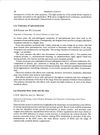 1 citations,
June 1987 in “British journal of dermatology/British journal of dermatology, Supplement”
1 citations,
June 1987 in “British journal of dermatology/British journal of dermatology, Supplement” Most patients tolerated spironolactone for acne and hirsutism despite common side effects like menstrual changes and breast tenderness.
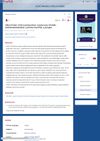 October 2023 in “Acta Medica Nicomedia”
October 2023 in “Acta Medica Nicomedia” Hirsutism greatly lowers the quality of life for Turkish women.
 September 2023 in “IP Journal of Nutrition, Metabolism and Health Science/IP Journal of Nutrition Metabolism and Health Science”
September 2023 in “IP Journal of Nutrition, Metabolism and Health Science/IP Journal of Nutrition Metabolism and Health Science” Recognizing and managing hirsutism, alopecia, and acne is crucial for improving wellbeing in women with PCOS.
 December 2022 in “Cureus”
December 2022 in “Cureus” Hormones significantly influence hair growth, with conditions like hirsutism and patterned hair loss linked to hormone levels; more research is needed for full understanding.
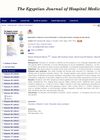 October 2022 in “The Egyptian Journal of Hospital Medicine”
October 2022 in “The Egyptian Journal of Hospital Medicine” Females with idiopathic hirsutism have higher levels of omentin-1, which may lead to excessive hair growth.
 June 2021 in “International Journal of Ayurvedic Medicine”
June 2021 in “International Journal of Ayurvedic Medicine” Phytoconstituents from Cyperus Rotundus may help treat hirsutism by interacting with the 5 α reductase enzyme.
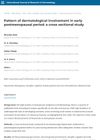 June 2020 in “International Journal of Research in Dermatology”
June 2020 in “International Journal of Research in Dermatology” Early postmenopausal women often experience skin issues like vaginal dryness, swallowing difficulties, hair loss, and uncommonly, keratoderma and hirsutism, but many are unaware these are related to menopause.
November 2017 in “JAMA internal medicine” Women also use 5α-reductase inhibitors for hair loss and hirsutism.
 April 2016 in “Journal of The American Academy of Dermatology”
April 2016 in “Journal of The American Academy of Dermatology” Hirsutism and acanthosis nigricans are reliable skin signs of PCOS and suggest the need for further tests for related health issues.
 April 2016 in “Journal of The American Academy of Dermatology”
April 2016 in “Journal of The American Academy of Dermatology” Hirsutism and acanthosis nigricans are reliable skin signs of PCOS linked to metabolic issues, while acne is not a reliable marker of the condition.
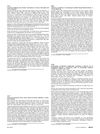 April 2016 in “Journal of The American Academy of Dermatology”
April 2016 in “Journal of The American Academy of Dermatology” Women with PCOS often have hirsutism and skin changes, which indicate a need for metabolic health checks.
 February 2010 in “Journal of The American Academy of Dermatology”
February 2010 in “Journal of The American Academy of Dermatology” White hirsute women with PCOS have higher insulin resistance, but similar nitric oxide and fibrinogen levels compared to those with idiopathic hirsutism.
The 2% spironolactone cream did not reduce hair growth in women with facial hirsutism.
 September 1997 in “Journal of the European Academy of Dermatology and Venereology”
September 1997 in “Journal of the European Academy of Dermatology and Venereology” Hirsute women with ovarian-sourced hirsutism are more likely to have irregular periods, with higher BMI and altered hormone ratios.
March 1997 in “Fertility and sterility” Finasteride is an effective and well-tolerated treatment for hirsutism.
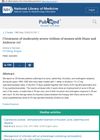
Diane and Androcur 10 improved acne and seborrhea in most women, and hirsutism and alopecia in about half.
 November 2021 in “Journal of The American Academy of Dermatology”
November 2021 in “Journal of The American Academy of Dermatology” Different stages and types of female hair loss are linked with age, menopause, high blood pressure, and skin conditions like acne and hirsutism.
April 2020 in “International journal of reproduction, contraception, obstetrics and gynecology” A postmenopausal woman with hair loss and hirsutism improved after surgery to remove an ovarian tumor.
March 2023 in “Current Pharmaceutical Design” Spironolactone is effective for idiopathic hirsutism but has limited effects on other PCOS symptoms.
 16 citations,
January 1987 in “Dermatology”
16 citations,
January 1987 in “Dermatology” The spironolactone cream did not reduce hair growth in women with hirsutism.





















